
Seven West Media has announced the findings of a review into chief executive Tim Worner, saying it has cleared him of wrongdoing.
Earlier this year, the company asked law firm Allens Linklaters to review allegations by former employee Amber Harrison of misconduct by Mr Worner.
In a statement to the ASX, the board said it was satisfied that there were no irregularities in Mr Worner's credit card use and that it could not substantiate allegations of illicit drug use.
It also accepted the "strong and vehement denials" by four other staff members that they had had an inappropriate relationship with Mr Worner, saying their responses "cast doubt on the veracity of other accusations" by Ms Harrison.
The board said that communications between Mr Worner and Ms Harrison - who had an affair from the end of 2012 until mid-2014 - while "totally objectionable", were "consensual, personal and private".
"The board has at all times made clear to Mr Worner that while the relationship, which concluded in July 2014, was personal and consensual, it was inappropriate given his senior position in the company and not behaviour condoned by the company," it said.
"Mr Worner has been disciplined by the chairman and the board and provided an undertaking this behaviour will not be repeated as well as an apology."
Seven West shares are down 0.9 per cent at 82 cents.
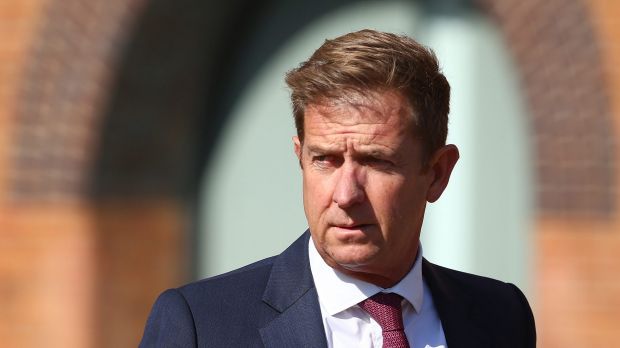

Service sector activity has kicked off the year solidly with lifts in sales, employment and new orders.
The Australian Industry Group's Performance of Services Index (PSI) dropped 3.2 points to a level of 54.5 points in January, but remained above the 50-point level signifying expansion.
Ai Group chief executive Innes Willox said decent activity in January followed expansion the previous two months.
"While growth eased back from the very strong pace seen in December, it was relatively broadly spread across the very diverse services sector and included the highest showing from the wholesale sales sub-sector since the global financial crisis and the related rise in transport and storage services, which entered positive territory for the first time since 2011," Mr Willox said.
"Tempering the generally positive tone and a reminder of the fragility of the economy was the continued contraction in both the hospitality and communication services sub-sectors."
Ai Group said four of the five activity sub-indexes expanded in January, with supplier deliveries rising to 61 points - its highest ever level.
Sales and new orders also expanded, but at a slower rate, while stocks declined into contraction.
Six of the nine services sub-sectors expanded in the month, led by personal and recreational, finance and insurance and property and business services.
Meanwhile, the survey showed that the massive health and community services sub- sector was flat in January.
Communication services contracted for a fourth month and the hospitality sub- sector, including accommodation, cafes and shrank for a thirteenth consecutive month.
Input prices rose - albeit at a slower pace - and wage growth accelerated, but selling prices returned to the mainly flat or contractionary pricing conditions seen through most of last year.


Rio Tinto, which agreed last month to sell $US2.45 billion ($3.2 billion) of Australian assets, has received approaches for its remaining coal operations in the country, people with knowledge of the matter said.
The company is considering options for its Hail Creek and Kestrel mines, including a potential sale, according to the people, who asked not to be identified because the details are private. Its controlling stakes in the operations, which are located in Queensland's Bowen Basin and mainly produce coking coal used in steelmaking, could fetch as much $2 billion, the people said.
Rio, the world's second-biggest miner, has been divesting Australian coal assets since dismantling its energy division in 2015. The company is focusing on its most profitable and long-life operations in iron ore, copper and aluminium as China's economy matures and growth cools, chief executive officer Jean-Sebastien Jacques told investors at a London seminar in December.
The assets are Rio's last producing coal mines globally after it agreed to sell its stakes in Australian thermal coal operations to an arm of China's Yanzhou Coal Mining for $US2.45 billion. A formal sale process for Hail Creek and Kestrel may not begin until Anglo American decides whether to sell its Australian coking coal mines, the people said.
Rio declined to comment in an emailed statement. The company said last month it has agreed or completed at least $US7.7 billion of asset sales since 2013.


Shares have managed to shrug off the overnight political jitters related to more Trump tough talk, as the ASX 200 adds 11 points, or 0.2 per cent, in early trade.
Many of the names that suffered during the so-called reflationary "Trump trade" are now enjoying some support: listed property, for example, is up 0.9 per cent as a group to be the best performing sector, while a 1.1 per cent gain in CSL is leading healthcare higher. The Aussie dollar, which came within a whisker of 77 US cents overnight, is steady at 76.6.
Investors are unimpressed with an earnings downgrade from James Hardie, and the stock is off 4 per cent.
The big banks are mixed, which is holding back the market from making further gains, with NAB and Westpac lower and CBA and ANZ higher, all by around 0.2 per cent.
The miners are lower, making the sector the only one in the red in early trade. BHP is off 0.7 per cent, Rio and Fortescue by 0.9 per cent.
Energy stocks are up despite lower oil prices, with Woodside 0.4 per cent.
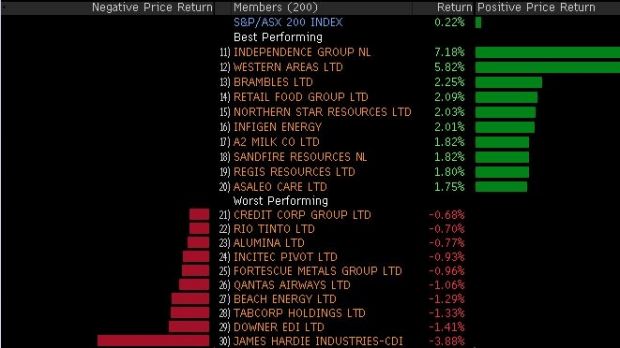

Virgin Australia has returned to profitability in the second quarter, posting a $13.1 million net profit but the airline will still be loss-making in the first half due to soft domestic demand and as it invests in a turnaround program.
Australia's second-largest airline reported an underlying profit, excluding one-offs, of $45.9 million for the second quarter and said its debt position had improved.This was an improvement on the first quarter underlying profit of $3.6 million.
Virgin said it had reduced net debt by $936.3 million in the quarter and its cash balance at Dec. 31 was $1.6 billion, up $689.1 million.
The airline said subdued domestic demand continued to hurt revenue in the quarter.
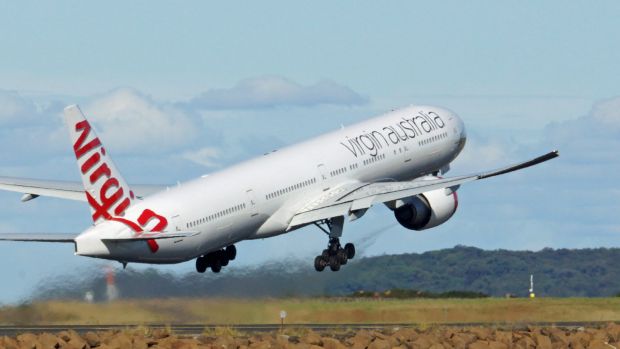

A few earnings reports rolling in: building materials supplier James Hardie has lowered its profit guidance, as its nine-month net profit rose by 8 per cent to $US232 million, helped by higher volumes in its North American operations.
Net sales for the nine months to December 31 rose 10 per cent on the same period last year, to $US1.43 billion.
But the company has further trimmed its full-year guidance, with net operating profit now forecast to be in the $US245-$US255 million range, down from its earlier estimate of $US250 million and $US270 million.

SPONSORED POST
Looking around the capital markets and we've seen some life in FX markets, but that is really where you have to look to see opportunity and any kind of reasonable range expansion, IG Chris Weston says:
US equities are largely unchanged and a focus on the S&P 500 shows materials and financials under modest pressure, with energy and staples putting in the points. That should flow through somewhat into the Aussie market on open, with BHP's ADR down 1.4%. Corporate credits spreads are unchanged, with fixed income really eyeing tonight's US non-farm payrolls print here, with the US 10-year treasury unmoved at 2.47%.
After a strong ADP private payrolls report yesterday's (246,000 jobs) and good expansion in the manufacturing ISM employment sub-component we are probably staring at a market that is positioned for a jobs print somewhat above the consensus of 175,000 jobs. Of the 87 economists surveyed by Bloomberg, the range of estimates is 238,000 to 140,000, so I suspect the market is eyeing a number above 190,000 (I'm going with 210,000), with an unemployment rate of 4.7%.
Wage data is always important, and the market expects 2.8% growth here. One suspects that good numbers in this data set and cries of the "Fed are behind the curve" will echo loudly. Poor numbers and we start to reassess our USD exposure, although on the whole US data is looking quite upbeat and we would expect a strong Q1 GDP print, but there will be headwinds from inventories and a weaker auto sector.
In the commodity space, we saw a decent pop in gold, with price breaking through the 24 January highs and into $1US225, but the sellers have been active and the price is looking like it will be unable to sustain a close through resistance. As mentioned yesterday, a close through $US1218 takes price into $US1241.
One suspects gold buyers will be cautious today ahead of the US jobs report as good numbers here, accompanied by a sell-off in US fixed income and USD strength and gold is likely to test the lows of $US1198 in yesterday's bullish hammer pattern. Those who bought yesterday will be deemed incorrect and we could see signs of reluctant selling here. The bigger support though is the 27 January swing low of $US1180 and this is the level where anyone who has bought in the last few days would have set stops below.

The probability the RBA raises interest rates in November this year is "somewhere in the 40s and rising" according to Goldman Sachs, which forecasts New Zealand rates to rise at the same time.
Tim Toohey, who is Goldman's economist in Australia, has three rate rises pencilled in for the RBA in 2018 but sees an increasing chance the RBA moves sooner.
On Thursday, it was revealed that a spectacular surge in coal and iron ore prices has delivered Australia its biggest trade surplus on record. The surplus widened in December to $3.51 billion from $2.04 billion in November, while economists had forecast a surplus of $2.2 billion.
It's not the first time he has floated the possibility the RBA has finished its easing cycle. In November, Toohey upgraded his GDP growth forecasts for the coming four years by as much as 0.5 percentage points and said there was a growing chance the Reserve Bank would start lifting interest rates in the second half of 2017, which should all support the currency.
"You've got to wonder why people are still looking for multiple rate cuts," he said on Thursday, citing financial conditions in Australia which he described as "an environment we think is actually the most expansionary for a considerable period".
"We will need to see some pick up on the consumer side but from the business conditions perspective, we're in the ballpark already," he said of the state of sentiment.
The weakness in employment he argued was concentrated in the retail sector. But measures of wages were improving, pointing to enterprise bargaining agreements where there is "a little bit of a pickup" in average hourly earnings and "you're getting stabilisation in these things three quarters earlier than we would have anticipated".
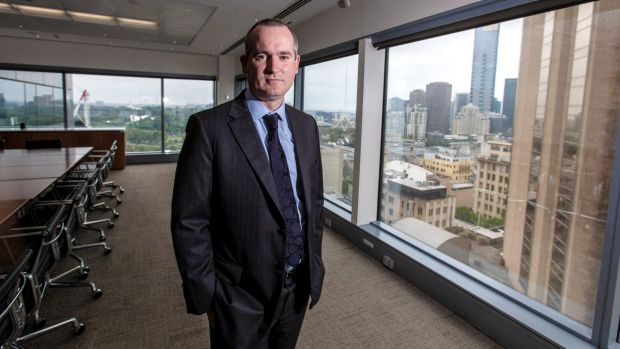

Here's how major markets performed overnight:
- SPI futures up 6 points or 0.1% to 5604
- AUD +1% to 76.60 US cents (overnight range 75.78 - 76.96)
- On Wall St, Dow flat, S&P 500 flat, Nasdaq -0.1%
- In New York, BHP -1.2%; Rio -1.8%, MIC -0.4%
- In Europe, Stoxx 50 -0.2%, FTSE +0.5%, CAC flat, DAX -0.3%
- Spot gold +0.4% to $US1215.21 an ounce
- Brent crude -0.3% to $US56.62 a barrel
- Iron ore flat at $US83.34 a tonne
- Steam coal +0.1% to $US82.75, Met coal +0.0% to $US168.00
- LME aluminium +0.6% to $US1829 a tonne
- LME copper -1% to $US5886 a tonne
- 10-year bond yield: US 2.48%, Germany 0.42%, Australia 2.77%

US stocks ended little changed overnight as the recent rally continued to stall following President Donald Trump's latest comments on trade and the policies he will pursue.
The S&P 500 traded at levels it was six weeks ago, losing steam as investors focus on Trump's priorities, such as restricting travel to the United States and rewriting trade deals.
Markets had run up sharply following Trump's November 8 election win on the expectation that tax cuts, deregulation and a fiscal stimulus would accelerate economic growth.
"The market had only priced in the potentially good type of policies like tax cuts," said Arian Vojdani, investment strategist at MV Financial.
"Now we're seeing potential protectionist and populist sentiment really come out and take the front seat. That could be bad for the world economy and that's why markets are taking a step back."
The Dow Jones Industrial Average fell 6.03 points, or 0.03 per cent, to 19,884.91, the S&P 500 gained 1.3 points, or 0.06 per cent, to 2,280.85 and the Nasdaq Composite dropped 6.45 points, or 0.11 per cent, to 5,636.20.
Trump reiterated his concerns about the trade deal with Canada and Mexico and said he would like to speed up talks to either renegotiate or replace it.
Investors are also wary of the consequences of other of Trump's comments, including labeling a refugee swap agreement with staunch ally Australia as a "dumb deal" and that "nothing is off the table" in dealing with Iran after it test-fired a ballistic missile.
"There's a lot of noise and we have to try at best to look at fundamentals," said Vojdani.
Earnings of S&P 500 companies are estimated to have risen 7.5 per cent during the last quarter of 2016 - the most in nine quarters.
After the closing bell, Amazon shares fell 3.7 per cent as the retailer's revenue missed analyst estimates. The company forecast a bigger-than-expected fall in operating income for the current quarter.
Facebook fell 1.8 per cent during the regular session to $US130.84 after hitting a record high of $US135.49. Its results on Wednesday beat earnings and revenue expectations.
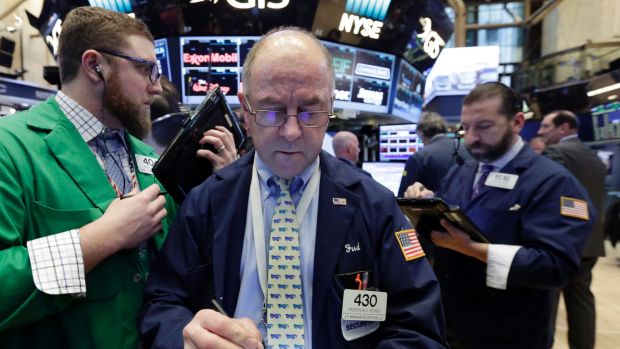

The Aussie dollar came within a whisker of US77¢ overnight following strong local trade data and after the greenback hit its its lowest level since mid-November before recovering to end the Wall St session flat.
The Aussie rose as high as US76.96¢, extending a rally that saw it rise more than 1 cent in the wake of the December trade surplus, the biggest ever on record. It's since retreated a bit and is currently fetching US76.62¢.
The trigger for the latest fall in the US dollar was more uncertainty around Trump's administration, as world equity markets were mixed as the new US president's aggressive language toward Iran offset strong data on the world economy.
US stocks fell after Trump's latest remarks on trade. In a meeting with lawmakers, Trump said he would like to speed up talks to either renegotiate or replace the North American Free Trade Agreement.
Trump also told reporters separately that "nothing is off the table" in dealing with Iran after its recent ballistic missile test. His comments came a day after his national security adviser put Tehran "on notice" over the test.
Investors also focused on solid economic readings from around the globe on manufacturing and inflation that suggest an improvement in 2017 as they positioned ahead of Friday's US nonfarm payrolls report.
"[Tonight's] NFP report is very, very important," said Douglas Cote, chief market strategist at Voya Investment Management. "The ADP report yesterday was very strong, corporate earnings were very strong, so we are in a positive fundamental backdrop for the economy, for corporations, for employment."
The Dow Jones and S&P 500 fell 0.2 per cent, while the Nasdaq Composite dropped 0.3 per cent after Apple and Facebook gave up some of their recent gains.
On Wednesday, the Federal Reserve left interest rates unchanged after its latest policy meeting even as it painted an upbeat picture of the economy.
"The Fed is concerned that the unraveling of trade deals could be very negative to the economy," said Peter Cardillo, chief market economist at First Standard Financial in New York.
"You could have improving earnings and good news on the economy, but that is getting overshadowed by the 'worry trade' with investors taking on a wait-and-see attitude."

Good morning and welcome to Markets Live for Friday.
Your editors today are Jens Meyer and Patrick Commins.
This blog is not intended as investment advice.
Fairfax Media with wires.
1 new post(s) available. View post(s) Dismiss
